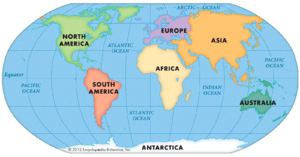Antarctica
| Antarctica |
|
|
Antarctica is Earth's southernmost and least-populated continent. It contains the geographic South Pole, situated almost entirely south of the Antarctic Circle and surrounded by the Southern Ocean (also known as the Antarctic Ocean). Antarctica is the fifth-largest continent, being about 40% larger than Europe, and has an area of 14,200,000 km2 (5,500,000 sq mi). Most of Antarctica is covered by the Antarctic ice sheet, with an average thickness of 1.9 km (1.2 mi).
Antarctica is, on average, the coldest, driest, and windiest of the continents, and it has the highest average elevation. It is mainly a polar desert, with annual precipitation of over 200 mm (8 in) along the coast and far less inland. About 70% of the world's freshwater reserves are frozen in Antarctica, which, if melted, would raise global sea levels by almost 60 meters (200 ft). Antarctica holds the record for the lowest measured temperature on Earth, −89.2 °C (−128.6 °F). The coastal regions can reach temperatures over ten °C (50 °F) in the summer. Native species of animals include mites, nematodes, penguins, seals and tardigrades. Where vegetation occurs, it is mostly in the form of lichen or moss.
The ice shelves of Antarctica were probably first seen in 1820 during a Russian expedition led by Fabian Gottlieb von Bellingshausen and Mikhail Lazarev. The following decades saw further exploration by French, American, and British expeditions. The first confirmed landing was by a Norwegian team in 1895. In the early 20th century, there were a few expeditions into the continent's interior. British explorers Robert Falcon Scott and Ernest Shackleton were the first to reach the magnetic South Pole in 1909, and the geographic South Pole was first reached in 1911 by Norwegian explorer Roald Amundsen.
About 30 countries govern Antarctica, all parties of the 1959 Antarctic Treaty System. According to the terms of the treaty, military activity, mining, nuclear explosions, and nuclear waste disposal are all prohibited in Antarctica. Tourism, fishing and research are the main human activities in and around Antarctica. During the summer months, about 5,000 people reside at research stations, a figure that drops to around 1,000 in the winter. Despite the continent's remoteness, human activity significantly affects it via pollution, ozone depletion, and climate change. The melting of the potentially unstable West Antarctic ice sheet causes the most uncertainty in century-scale projections of sea level rise, and the same melting also affects the Southern Ocean overturning circulation, which can eventually lead to significant impacts on the Southern Hemisphere climate and Southern Ocean productivity.
Etymology
“Arctic” comes from the Greek arktos, “bear,” because the constellation Ursa Major, “the greater she-bear” (also known as the Big Dipper), is always visible in the northern polar sky. “Antarctic,” then, means “opposite the bear” or "without a bear."
| The Seven Continents: Africa • Antarctica • Asia • Australia • Europe • North America • South America |
External links
- More information is available at [ Wikipedia:Antarctica ]
Chat rooms • What links here • Copyright info • Contact information • Category:Root


